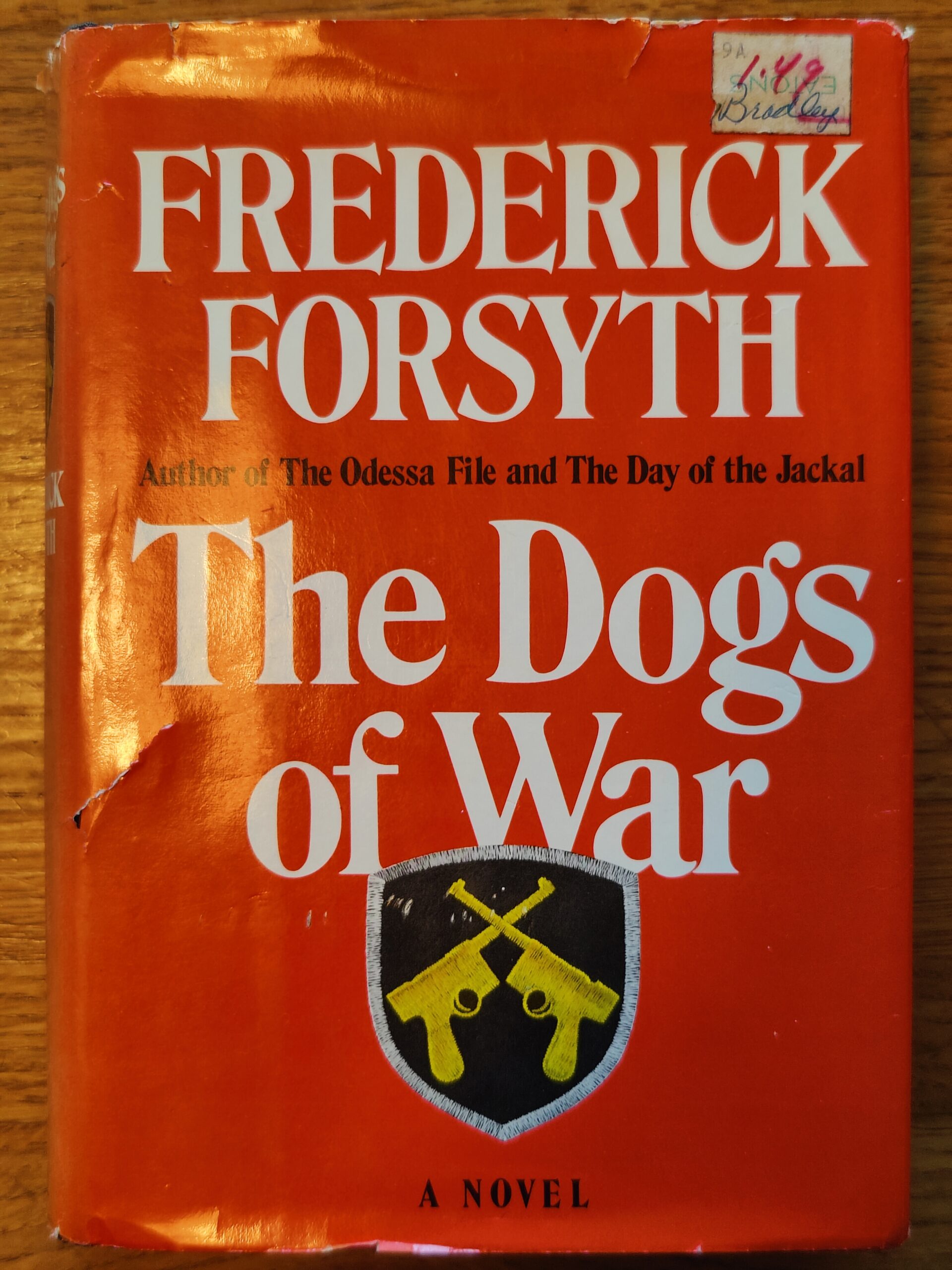Note: Don’t worry, “Introduction to Optics” will return next week.
Regular readers of the SDCGO blog know of my quest to assemble a first-class library of firearm-related books, from history tomes to gunsmithing guides, a few of which I’ve overviewed in my previous book reviews. This week’s blog post marks a departure from the series in that it reviews not a nonfiction book, but a novel—Frederick Forsyth’s The Dogs of War. Regarded by some as a textbook for mercenaries, this 1974 novel chronicles in great detail a coup against a fictional West African dictatorship to secure mining rights for a slimy London-based conglomerate.
So what does it take to bring down a third-world government? Planning. Lots of planning—in fact, scarcely a tenth of the book covers what Forsyth euphemistically terms “the big killing.” The preceding ninety or so percent follows our protagonist, Anglo-Irish paratrooper-turned-mercenary Carlo “Cat” Shannon, as he navigates Europe’s criminal underbelly to assemble the resources needed to “knock off” an entire government. What distinguishes Shannon as a mercenary commander rather than a simple hired gun is his organizational acumen and fastidious attention to detail. These qualities make him an ideal character from whose point of view to show the reader every step of the operation, from the day he’s contacted by a representative of the shadowy Manson Consolidated corporation (ManCon) to the moment the first gunshots ring out.
The reader follows as Shannon assembles his team, negotiates with black-market arms dealers, and secures a cargo ship, with bribes every step of the way. For their part, ManCon moves money and assets around between a shell company and a series of offshore bank accounts in continental Europe to finance the whole operation. To bring to life this world of smuggling and subterfuge, the author draws on his firsthand experience covering the Biafran War (1967-70)—first as a BBC correspondent, then as a renegade journalist after the publication tried to reassign him. Forsyth was following rebels and mercenaries in a desperate brush war years before anyone was reading Soldier of Fortune magazine or listening to Warren Zevon’s “Roland the Headless Thompson Gunner.”
Lest the reader dismiss The Dogs of War as a pulp thriller, let me remind you that everything in this story actually happened. True, most of the characters are fictionalized, as is the African country they work to take over, but every component of the narrative is closely based on true events. From the blood-soaked decolonization conflicts of the ‘50s and ‘60s through to the modern day, wars have been fought by men like Cat Shannon, plotted and bankrolled by the ManCons of the world. This isn’t a fanciful tale of high adventure, it’s the story of dozens of violent conflicts over the past seventy years or so, from Sierra Leone to Iraq, Rhodesia to Ukraine. In fact, this novel is far more believable than some of the true stories—see Neall Ellis for example.
Although the colorful cast of mercenaries, arms dealers, smugglers, and other agents of the underworld are the true stars of the show, the reader is also treated to realistic depictions of a variety of now-historic arms. Forsyth’s background as a war correspondent really shines through as he shows various characters using M1911s, war-surplus MP 40s and Mausers, a smattering of Yugoslav heavy weapons, and at one point, a Makarov. Firearm enthusiasts will appreciate the way he writes about the weapons, portraying them accurately as tools of the trade instead of fetishizing them as some authors do.
The Dogs of War isn’t just a good book, it is an important book. I can praise its sharp dialogue, I can remark that the novel never seems to drag despite its 408-page length, I could tell you all about how the twist ending left me satisfied, but none of those are what give the novel its true value. As you read this book, keep in mind that every major plot point contained therein has really happened, will continue to happen, and is going on somewhere in the world this very moment. As such, I consider the used copy I bought online well worth the $7 or so I paid for it, and I give The Dogs of War my strong recommendation. Go find it in your local library system or scoop up a copy for yourself.





Comments